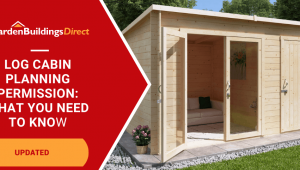Jump to:
Allotments are great for aspiring gardeners who don’t have a garden at home. They’re usually small plots of land you can rent from the local council, though sizes vary. Once you’ve got your lease, you can grow fruit, veg, and plants—or even keep bees and smaller animals like hens. Now, you might be thinking about adding a shed, whether for extra storage or to make the most of your allotment garden.
You can add an allotment shed, as long as there’s space, but there are rules to be aware of, along with things to consider—like the best type of shed for the job. Here’s what you need to know.
Can You Build a Shed on an Allotment? The Rules
Yes, you can—as long as you’re following these rules and requirements:
Get permission first
Don’t put up a shed without approval from your local council, allotment association, or whoever manages the site. It also helps to check your lease agreement to make sure you’re following the guidelines.
Once you’ve got written consent, only then will your allotment shed be allowed. But that’s not all—your shed also needs to comply with the rules of your shared growing space to keep things fair and organised.
Temporary structures are only allowed
Since you’re renting, you can’t put up anything permanent. You can, however, set up a temporary allotment shed or other structures as long as you have permission.
Your best bet is a shed that’s somewhere between small and medium in size and made from lightweight materials. 8×6 sheds fit the bill. They’re compact but still big enough to store tools, pots, and supplies, and not too heavy to move if needed. 8×6 feet is also the maximum size allowed in most allotments.
When choosing materials, metal and plastic are good options. A metal shed, especially one made of hot-dipped galvanised steel panel material, is lighter than thicker steel or a wooden shed.

Take the Sapphire Apex Metal Shed, for instance. Made from the same durable material, all parts come pre-cut with pre-drilled holes for easy assembly. It doesn’t have built-in flooring, which makes it even lighter and much easier to move if needed.
A plastic shed offers the same lightweight nature, even with reinforced metal framing. The metal isn’t there to add weight but to provide extra support and stability. Some plastic sheds come with a foundation kit as standard (more on that later). These kits aren’t permanently attached to the shed, so you can install them or use a different foundation.
Stick to the recommended shed size based on your allotment’s rules. A lighter shed is always a good choice, as it makes setup and moving much easier. If you need more tips on moving a shed, check out this guide: How to Move Your Garden Shed
Build your own base (for temporary use)
Since allotment gardens are mostly soil, it’s up to you to make sure the structure has a proper base. If your shed doesn’t come with a foundation kit, you can use paving slabs, bricks, or any suitable option.
It’s a golden rule to place any garden structure on a solid, level base for stability and support. Paving slabs are flat concrete stones or tiles made from concrete, natural stone, or recycled plastic. They provide a temporary but sturdy base, keeping your shed level and off the soil.
Bricks are a great semi-permanent option, especially for allotments where full concrete bases might not be allowed. They provide good drainage and are easy to adjust, reuse, or move around with minimal effort.
Or, you could go for a quick-fit base kit as another option. These ready-to-use foundation systems that, once placed on the ground and interlocked, form a solid, level surface for the shed to sit on.
Base kits generally come with a weed-resistant membrane to stop weeds from growing through. Just fill each grid with gravel (at least 10mm in diameter, like pea gravel), and you’ve got yourself a sturdy base.
The grid-like design makes it easy to move and reuse elsewhere—ideal for temporary setups.
Use and maintain your shed responsibly
You may have your own plot to grow what you like, but remember that others are using the space, too.
Don’t leave your tools or other valuables on the site, as there’s no guarantee they’ll still be there if left unattended. If you need to store anything, keep it locked away in your shed. A sturdy padlock, like these shed locks, can help, but we recommend storing only essentials and avoiding too valuable items inside.
Speaking of storage, chemicals, fuel, or anything highly flammable is not recommended, as they can pose serious risks. Not only do they increase the chance of accidents, but they could also make your shed a target for arson. If you need to use fertilisers or other gardening chemicals, keep them at home or in a safe, designated area (if your allotment site has one).
Your shed is your responsibility to repair and maintain—no one else’s. This is a common rule in most allotment gardens. If the authorities decide your shed is unsuitable, they can ask you to remove it, and that’ll be at your expense. So, give your garden shed a bit of TLC now and then to keep it in good shape and avoid any issues.
Note: Anything you leave in your shed is also your responsibility. The council won’t cover any loss or damage to items stored on site.
Can You Build a Greenhouse on an Allotment?
If a shed isn’t for you, a greenhouse is a great option—so yes, you can build one. Just like with sheds, you’ll need written permission from your local council or allotment site manager before putting it up.
The size should be no more than 8×6 feet, and when it comes to materials, opt for a metal greenhouse because it’s lightweight and easy to manage.

The BillyOh Rosette Hobby Aluminium Polycarbonate Greenhouse could be just what you need. It’s built with a strong aluminium frame, a space-saving sliding door, and all-round glazing to let in plenty of light throughout the day.
If your allotment is near a building, a lean-to greenhouse could be a great space-saving option. The BillyOh Polycarbonate Lean-To Greenhouse has a similar design and features to the Rosette, but it’s designed to be installed against a wall for support. Even better, it comes with a strong galvanised steel base for added stability.
Round-up
You can set up a shed on your allotment as long as you have permission. It should be no bigger than 8×6 feet and ideally made from lightweight materials for easy handling. For the base, paving slabs, bricks, or quick-fit base kits are great temporary options.
Make sure to follow all allotment guidelines, including how you use your shed and what you’re allowed to store inside. A greenhouse is a good idea if you’re more focused on protecting your plants rather than needing extra storage.
These are general guidelines to give you an idea of what to expect. Rules and regulations vary, so always check with your allotment provider and follow their requirements.
Now that you’re all set, here are more ways to make the most of your space: 12 Allotment Ideas to Maximise Your Garden Plot
For more help choosing a garden shed, check out our sheds buying guide.






